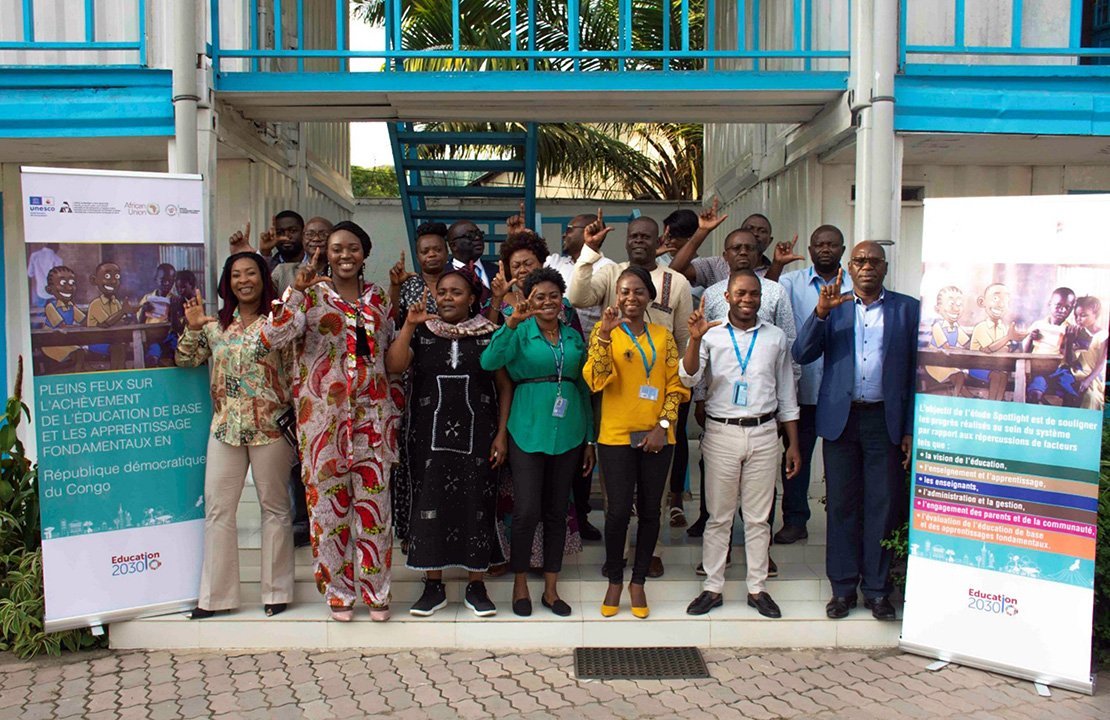Spotlight country-level report on basic education in DRC launched

On February 14th, 2023, ADEA and UNESCO launched the country-level Spotlight Report for the Democratic Republic of the Congo (DRC). The report, which reviewed the status of foundational learning in the country, is one of five country reports on foundational learning. The country reports feed into the continental report on Africa and, together, make the Spotlight Report series on Basic Education Completion and Foundational Learning. This report is the first of a three-part series.
Based on the study’s findings, here is what we know about the study in DRC.
What is working
- Since 2016, the Democratic Republic of the Congo has committed to ambitious education sector reforms. It developed the Stratégie sectorielle de l’éducation et de la formation (SSEF, Education and Training Sector Strategy) in 2016.
- The SSEF resulted in the introduction of free basic education in 2019/2020 school year enabling 2.5 million more children to attend school in its first year.
- Increase budgetary allocation to education since the commencement of the SSEF policy implementation.
- The country has progressed in primary school attendance. The primary gross enrolment ratio [1] now exceeds 100%. However, late entry and high repetition result in a net enrolment ratio of 69% and 3.5 million children out of school at primary level.
- Primary education completion rate increased from 32% in 2000 to 47% in 2010 and 58% in 2020.
- DRC accounts for a very large percentage of overage enrolment on the continent, 82% of whom completed primary school in 2020.
- A national reading roadmap has been developed, and performance standards for reading in French and the four national languages have been established.
Areas of improvement
- The overall quality of education remains very low because of insufficient funding, lack of equipment, dilapidated buildings, overcrowding due to increased enrolment, poor opportunities for teacher professional development, and unpaid teacher salaries.
- Poor student skills at the beginning and end of primary school have been observed. The 2019 PASEC learning assessment found that only 27% of students achieved the minimum level of proficiency at the end of primary school.
- The study showed that the budget is insufficient to improve learning significantly, and households still carry the greatest burden of financing education, currently funding 42% of total education expenditure in the country.
Quote from a participant at the workshop to launch the report;
‘the greatest thing school gave me in life was the ability to read’.
Recommendations
The study proposed four recommendations to improve learning outcomes and deepen the gains from government-driven reforms:
- Increase the resources allocated to the education system and schools. This could be used to build new school infrastructure (buildings and classrooms), rehabilitate older buildings, pay teachers better and procure reading materials for pupils.
- Prepare and supervise teachers through more effective in-service training and regular school-level inspections.
- Establish the pilot institute for teacher training as recommended by the SSEF.
- Education partners should prioritize strengthening teacher trainers’ skills, encourage teacher mentoring by directors and improved monitoring by education inspectors.
- Government should provide teachers with a decent salary to motivate them.
- Clarify and disseminate the vision of education more widely, including the sensitization of all education stakeholders on the importance of teaching and learning. This will require broad consultation with a range of education stakeholders at the provincial and sub-provincial levels to reach an agreement on key messages, along with sensitizing actors at all levels through flyers, at Service national de formation (SERNAFOR, National Training Service) training sessions and during workshops.
- Produce and disseminate appropriate textbooks and other educational materials aligned with the curriculum and adapted to reflect local languages. The government must develop a clear plan for producing textbooks and disseminating them in schools for all subjects. Moreover, in collaboration with the government, financial and technical partners, should ensure that reading textbooks are adapted to capture the variants of national languages.
The #BorntoLearn report was developed collaboratively between the University of Kisangani the Ministry of Primary, Secondary and Technical Education (Ministère de l’enseignement primaire, secondaire et technique (MEPST)). Follow this ADEA on social media to read the full report and the summary version of the report.
[1] Gross enrolment ratio for primary school is calculated by dividing the number of students enrolled in primary education regardless of age by the population of the age group which officially corresponds to primary education and multiplying by 100.